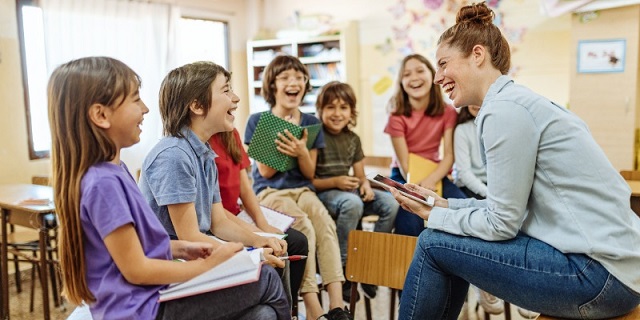Education
More money not the answer for schools—just look at Alberta

From the Fraser Institute
If you didn’t already know, higher government spending on schools doesn’t necessarily produce better results. Just look at what’s happening in Alberta.
According to Statistics Canada, from 2012/13 to 2021/22 (the latest year of available data), per-student spending in Alberta increased by 2.1 per cent from $13,146 to $13,421. After adjusting for inflation, this amounted to a 17.2 per cent spending reduction.
This stands in sharp contrast to most other provinces. During the same 10-year period, inflation-adjusted per-student spending increased in Quebec (by 24.6 per cent), British Columbia (5.1 per cent) and Ontario (0.5 per cent). By the raw numbers, Alberta now spends less per student than any other province.
The results?
According to the latest Programme for International Student Assessment (PISA) tests, Alberta students scored second only to Quebec on their math skills and almost half a grade level ahead of their peers in B.C. (even though B.C. spent $1,468 more per student in 2021/22). Even better, Alberta students scored highest in the country on their PISA reading and science assessments. This is exactly the opposite of what we’d expect if less spending hurt student performance.
Of course, this doesn’t mean that money is irrelevant. In countries that spend considerably less on education than Canada, more spending does correlate with better academic results. Excessive teacher turnover harms student learning and students must be in a stable learning environment to excel. If teachers aren’t paid enough to make a decent living, they will not remain in the profession, and students will suffer.
However, things are quite different in Canada where all provinces including Alberta already spend a significant amount on education. Governments should spend more wisely rather than simply pour more money into the education system.
Since Alberta is a top-performing province, it’s worth asking what makes this province different. Simply put, Albertans have more educational choice than any other province. Not only does Alberta have fully-funded public and separate school systems, accredited independent schools receive 70 per cent of per-student grants available to public schools, which makes it easier for independent schools to keep tuition affordable for parents. And it’s the only province to allow charter schools, which are fully-funded public schools that operate independently from government school boards. This makes it easier for charter schools to offer specialized programming based on parental demand and creates an incentive for government school boards to diversify their programming options.
Alberta also has a rigorous standardized testing program. Grades 6 and 9 write provincial achievement tests in English language arts, math, science and social studies. Meanwhile, Grade 12 students write diploma exams in a variety of courses that are worth 30 per cent of their final mark. These tests and exams play an important role in holding schools accountable.
However, before Alberta politicians get too comfortable, it’s important to note that Alberta, despite its relative success compared to other provinces, saw a significant decline in academic achievement over the last 20 years. The latest PISA tests show that Alberta students declined in their math skills by 45 points from 2003 to 2022. To put this in perspective, PISA equates 20 points with approximately one grade level. In other words, Alberta students are (on average) approximately two years behind in their math skills than they were in 2003.
Getting to the root cause of this decline will take considerable effort. But one thing we know for sure—despite any rhetoric to the contrary, simply spending more money will not solve this problem. As another school year begins, policymakers in Alberta and across the country should keep this in mind.
Author:
Red Deer
Red Deer Student honoured with Chief Youth Courage Award

When you meet Brayden Chenier, a Grade 8 student at GH Dawe School, it’s clear why he’s been chosen to represent youth across Alberta. Brayden is the proud recipient of the Integrated School Support Program Provincial (ISSP) Chief Youth Courage Award, presented by the Calgary Police Youth Foundation, in recognition of his resilience, leadership and commitment to his community.
The award celebrates students who demonstrate courage and dedication to becoming a responsible and caring citizen, especially within a diverse school and community, and was presented earlier this spring at the Calgary Police Awards Gala. As part of the honour, Brayden will now serve as a youth ambassador, helping to raise awareness about child and youth crime prevention, education, and intervention programs across the province.
“It’s pretty surreal that I will be all over the province for a year,” said Brayden. “I am looking forward to helping out in the community.”
Brayden has been part of the ISSP program through GH Dawe School since 2023 and has benefited greatly from the support offered.
With the support of the mental health professional, Brayden has been able to successfully navigate a variety of challenges in his life including coming to terms with his disability and navigating a tragic loss in his life.
Born with clubfoot, Brayden has never let his physical disability stand in his way. He is an avid athlete in a number of sports including hockey, basketball, golf, track, volleyball and soccer. His goal is working towards becoming an athlete in the Paralympics.
Brayden was nominated by GH Dawe School Counsellor Amy Johansson, who described him as a compassionate, kind, hardworking, and honest person who is driven and motivated to be his very best at all that he attempts.
She added that within the GH Dawe School community, Brayden is a highly respected citizen by all students and staff. “He is highly committed to sports connected to our school, as well as sports outside of our school community. Brayden works diligently at his academics. And is so very helpful and caring, always. Brayden works to overcome a list of things that he will not allow to hold him back.”
GH Dawe School is part of Alberta’s Integrated School Support Program – a child wellness initiative aimed at improving academic performance and the overall well-being of students. The program supports schools like GH Dawe with services to meet the diverse needs of students and families.
As he takes on his role as a provincial ambassador, Brayden continues to be a role model for his peers and a reminder of the power of perseverance and community support.
Alberta
Too Graphic For A Press Conference But Fine For Kids In School?

From the Frontier Centre for Public Policy
By Lee Harding
Alberta moves to remove books after disturbing content, too graphic for media to view, was found in schools
Should elementary school children be given books to read with harsh insults against minorities, depictions of oral sex, and other disturbingly graphic and explicit content?
Such books have been in some Alberta elementary schools for a while, and in many school libraries across Canada.
In late May, the Alberta government announced it would establish new guidelines regarding age-appropriate materials in its schools. A government press release included quotes with disturbing content, but at a press conference, Education Minister Demetrios Nicolaides said some book illustrations could not be shown.
“I would show these images to all of you here and to the media, but they are too graphic for a live-stream media event. These examples … illustrate the kind of content that raises concerns amongst parents,” Nicolaides said.
You don’t say? This seems like the sort of stuff no one, except a pervert in a park, would dream of showing to a child. Ironically, the inability to publicize such graphic materials is part of the reason they have been shown to children with little public awareness.
Citizens’ group Action4Canada (A4C) has claimed its activism played a pivotal role in the Alberta decision. The organization has compiled a 36-page document online with examples of objectionable content in Canadian schools. Among the worst is Identical by Ellen Hopkins, which includes graphic descriptions of a little girl being molested by her father.
A4C founder Tanya Gaw has repeatedly tried to raise concerns about objectionable books with school boards, often without success. In some cases, she isn’t even allowed on the agenda if she states her topic upfront. When she is permitted to speak, she’s frequently cut off as soon as she begins quoting from the books, preventing the content from entering the public record.
In January 2023, Gaw made an online presentation to a school board in Mission, B.C. regarding materials in their schools. As she began to screenshare what was there, some board members objected, saying such permission had not been given in advance.
One month later, the board banned Action4Canada from making any further presentations. In later media interviews, the board chair justified the decision by saying Gaw’s PowerPoint contained some graphic and “inappropriate images.”
Exactly, and that is the problem. A recent check showed Mission’s school division only removed four of 15 books A4C objected to. Gaw is just glad “Identical” is one of them.
Pierre Barns, a father from Abbotsford, B.C., made it his mission to notify school boards across Canada what was on their school shelves. An online search was all it took to confirm. A “reply all” from a board member at the Halton School District in Ontario was most ironic.
“I am concerned. This individual has included links to publications and videos which may contain illegal content,” she wrote.
“I’m not sure how to investigate the content of the email safely. Would you please advise us whether or not this person ought to be reported to police? Is there some action we should take?”
There probably was action they should have taken, such as removing the books, but that never happened. Later, they defended a biologically male teacher in their school division who made international headlines by wearing large prosthetic breasts to school.
The Alberta government has committed to conducting public consultations before implementing new policies. It’s a good time for parents and citizens there and in other provinces to speak up. A young mind is a terrible thing to corrupt, but unfortunately, some schools are part of this corrosive effort.
Lee Harding is a research fellow with the Frontier Centre for Public Policy.
-

 conflict2 days ago
conflict2 days agoIran nuclear talks were ‘coordinated deception’ between US and Israel: report
-

 Alberta2 days ago
Alberta2 days agoPunishing Alberta Oil Production: The Divisive Effect of Policies For Carney’s “Decarbonized Oil”
-

 International2 days ago
International2 days agoIsrael’s Decapitation Strike on Iran Reverberates Across Global Flashpoints
-

 Energy2 days ago
Energy2 days agoCanada is no energy superpower
-

 Alberta2 days ago
Alberta2 days agoAlberta Premier Danielle Smith Discusses Moving Energy Forward at the Global Energy Show in Calgary
-

 Health2 days ago
Health2 days agoJust 3 Days Left to Win the Dream Home of a Lifetime!
-

 Fraser Institute2 days ago
Fraser Institute2 days agoLong waits for health care hit Canadians in their pocketbooks
-

 conflict1 day ago
conflict1 day agoOne dead, over 60 injured after Iranian missiles pierce Iron Dome




